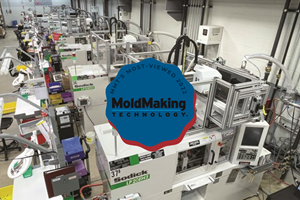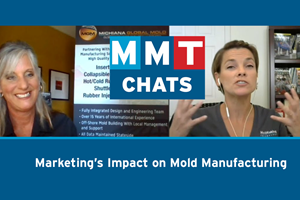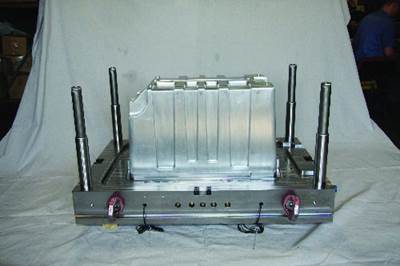2016 Leadtime Leader Awards HM: MSI Mold Builders - Optimizing Lead Times
This mold manufacturer combines continuous improvement strategies with machining power to maximize growth and opportunity.
MSI Mold Builders may make its home in the rural outskirts of Cedar Rapids, Iowa, but there’s nothing bucolic about this company’s capabilities and drive to build molds to exacting standards while maximizing efficiencies in its operations. It is focused on continuous improvement and opportunities for growth, and this and an impressive range of lead times is what makes MSI our 2016 Leadtime Leader Honorable Mention winner.
MSI, which originally stood for Manufacturing Specialties Inc., was founded in 1971 by Ed and CharLes Klouda in Swisher, Iowa, offering moldmaking and repair services. Their son Roger joined the business in 1978 and has led the company to what it has become today—a manufacturer that specializes in building injection, structural-foam, compression, blow, gas-assist, and structural-web molds. Now owner and president, Roger Klouda says MSI’s primary market is medium- to large-size injection and structural foam molds.
Led by Klouda and a senior management team composed of Toby Bral, sales manager, and Jason Bramstedt, general manager, the company operates with 69 employees in its recently expanded 47,000-square-foot facility in Cedar Rapids and an additional 28 employees in a 20,000-square-foot facility in Greenville, South Carolina. MSI is especially known for its niche in large molds for presses of 500 tons and higher. The molds are mostly one- or two-cavity constructions in a wide variety of size ranges, including small to medium molds for presses ranging to 600 tons (lead times six to eight weeks); large molds for presses to 2,000 tons (lead times eight to 12 weeks); and “giant” molds for presses of 2,000 to 7,000 tons (lead times 12-16 weeks). Industries served include agriculture, heavy truck, medical, recreational, industrial, automotive and residential.
Managing for Advancement
MSI’s primary competition is other large, domestic mold shops as well as those overseas, but the company says it keeps customers coming back by maintaining a high level of efficiency and consistency in its operations. Bral says this is accomplished by constantly evaluating the company’s processes to ensure its molds are manufactured as efficiently as anyone else’s in the industry. “It’s a company-wide, cultural review process,” he says. “Some processes we follow—like quoting, launching a job, designing it, etc.—are pretty standard. What makes it better is remaining open to ideas. We’re constantly fine-tuning the way we do things, and our employees are encouraged to offer new and better solutions for any operation they perform.”
One example of this occurred when an employee wondered why a pre-material layout check was being done so close to the customer’s review. He pointed out that this timing did not leave much leeway for MSI to make any needed adjustments, so MSI changed the timing of layout checks. “That’s how you get better,” Bral says. “You work through a lot of little things that add up to significant improvements throughout the plant.”
Bral says MSI is also focused on solutions that will drive more efficient mold setup times, maximize unattended machining and grow its mold-building capacity. For example, the 12,000-sqare-foot addition to the Iowa facility in 2014 enabled the company to greatly expand its mold-size and weight-handling capabilities by enabling it to add two 30-ton cranes and a large Parpas Formula horizontal five-axis CNC mill with travels of 12 feet by 20 feet. “We were finding that, although we were known for large molds, there were more, larger molds that really pressed our capabilities in these areas. The Parpas CNC helped rectify that problem,” Klouda says. “Installing a 3,000-ton Van Dorn injection molding press for sampling added the last remaining major capability that our competitors in the extra-large-mold market had that we did not have.”
While the recent machine purchases have increased capacity and lead times have improved over the last decade, Klouda admits that some obstacles still remain. “The build time is significantly less than it was 10 years ago due to process and manufacturing improvements. When we have good models, product details, etc., to work with, then the lead times are much less,” he says. “But that’s not always the case nowadays. We’re running into fewer well-done models, and the customers’ part designers’ lack of knowledge has a lot to do with it. They seem to be just applying technology, because they know how to use the software, versus knowledge of good part design for plastics and tooling. We often go through many iterations of part designs before a project is approved, and this can slow down the process. As a result, we are assisting more in part design than in the recent past.”
While lead times for its molds are important to MSI, both Klouda and Bral are quick to point out that OEMs also have condensed time frames within which they must work, so the most important question is, “Are we hitting your customers’ targets?” as opposed to “What are our lead times?” Klouda says MSI’s focus is to try to meet every customer-required deadline. “The customers’ target dates are really what are key to our business,” he says. “Whatever those dates are, we have to hit them.”
Having the ability to sample in-house with the 3,000-ton Van Dorn press has probably been one of the most significant contributors to cutting lead times, Bral says. Because of the shop’s rural location and the fact that it builds such large molds, it previously was costly and time-consuming to ship tooling elsewhere for sampling and then back. “We have to have in-house sampling capability to stay in the game,” he says.
Meeting Repair Needs in the East
The 20,000-square-foot facility in South Carolina, opened in 2001, also gives MSI the capacity to remain competitive and helps shorten lead times. Bral says, although smaller, this facility operates very much like the Iowa shop except that it has fewer five-axis milling machines, so MSI tends to build smaller sized molds there. Multi-mold projects also are often divided between the locations based on schedules and mold sizes. However, he adds that, ironically, most of MSI’s South Carolina customers require larger molds, and most of MSI’s bigger customers are based on the East Coast, so it boils down to each facility getting a mix of work.
Additionally, about 85 percent of MSI’s business in the Iowa shop is in new-mold manufacturing, but because South Carolina is geographically closer to the central customer base, Bral says that facility is strategically positioned to handle more mold repair and maintenance, as well as engineering revisions. Currently, those services make up 30 to 35 percent of that shop’s business and mold building about 65 to 70 percent. Five years ago, its repair and engineering revision work was more comparable to that of the Iowa facility’s, at 15 percent, but Bral says customer demand for these services has grown, so MSI recently invested in a larger, 25-ton crane and a larger five-axis CNC mill from Italy-based FPT Industrie SpA. This enables the facility to both build more larger molds and repair them.
Standardized and Lean
MSI says it has spent more than 15 years implementing lean manufacturing principles to transform its shop from a moldmaking environment to a mold manufacturing environment. For one, the entire operation is departmentalized, and 3D models are used to communicate critical points within a project so that when a mold is received by a particular department, that team will know specifically what it should focus on. The shop floor is set up like an assembly line. Blocks of tool steel begin at the front of the shop and become more and more complete as they near the mold assembly area and back door.
Standardization is another way in which MSI controls the quality and integrity of its molds, not to mention keeping costs and lead times down. “When we build a mold, 98 percent of the time it’s never been built before, so we try to use standardized tooling to eliminate recreating the wheel,” Bral says. The shop stocks multiple sizes of leader pins, support pillars and other components, as well as multiple sizes of bar stock. Common hole sizes are preprogrammed in the machining centers to save time in the hole-drilling process, as are programs for machining water lines. The feature recognition function within the Lemoine CAM software the shop uses will kick out anything that is not consistent with established programs, Bral says. “All of this helps us spend a lot less time on the manufacturing floor than we would otherwise.”
Before a project is even sent to the shop floor, Bral says MSI’s project management team tries to solve as many potential issues as possible in the late quote stages and very early in the mold design process. This includes examining designs from the molder’s perspective to uncover unfavorable tooling conditions like inadequate drafts for shutoffs, venting issues and thin-steel conditions. MSI then examines the designs from the OEM’s perspective, considering end-use quality and what issues they might encounter, like filling conditions. While it can be time-consuming, Bral says these steps are critical for reducing overall lead times in the shop and for ensuring that designs are robust.
MSI tracks quality issues to maximize “first-pass efficiency,” meaning a job should be complete on its first pass through a CNC machine, without issues, Bral says. Similar to MSI’s “cultural reviews,” Bral says the information collected, which can be any type of nonconformance, is used to evaluate what may be causing downtimes and to drive improvements on the shop floor. “We track costs and quality, rework hours, etc., and make sure we are improving on them,” he says. MSI also holds daily status meetings in which project updates are given and issues are shared so that everyone involved in the project is aware of them and can prepare to resolve them quickly.
Another way MSI has streamlined operations is by front-scheduling machines. “Previously, we would work to meet required end-department dates, but if we missed a deadline in, say, the CNC department, it made us fall behind with subsequent work in other departments,” Bral says. “Now, by front-scheduling the machines, especially in the milling department, we’re looking at how far ahead of our end-department dates we can get a job completed and moved downstream. One way to do this is by offline programming, so that when that block hits a machine it’s ready to go. Front-scheduling helps us build some cushion into a job for those ‘just-in-case’ scenarios where issues come up and we need more time to fix them.”
To further ensure work flows smoothly and quickly through the shop, MSI has implemented workholding systems in its small-component area, where slides, lifters, cams, inserts, or other small mold components are machined. The FCS modular clamping system (Breyl) from Single Source Technologies, used to position a workpiece in the machine, speeds the setup process, he says. MSI has also installed this system on its EDM machines and on the Parpas CNC mill, and plans to continue adding it to machines throughout both plants as a lean strategy to increase unattended machining.
Employee Development
While advancing automation in both of its facilities helps MSI stem the effects of limited skilled labor, the company does have a well-developed internship program in both Iowa and South Carolina, and offers frequent plant tours to expose high school and college students to the career options that are available in mold manufacturing. This internship program consists of three levels, high school, first-year college and second-year college, each with different responsibilities. For example, a high school student might gain exposure to the overall manufacturing environment by sweeping or cleaning or otherwise lending a hand to workers, and maybe shadowing during his or her summer break, while a first-year college intern might learn to run a lathe or similar entry-level machine. A second-year college student who presumably by then has made a commitment to work in the manufacturing industry might learn more advanced machining skills by operating more complex equipment.
Scholarships also help to support students in the CNC machining program at Kirkwood Community College in Cedar Rapids, furthering MSI’s goal to help develop the future workforce. MSI also pays 100 percent of the tuition and buys text books for its interns, provided they have earned a minimum B grade in each class taken and that they have attended at least 90 percent of each class’ sessions. The company currently has five interns, four of whom attend classes at Kirkwood and one who works in the South Carolina facility and attends Greenville Technical College.
As for employee development and retention, MSI conducts regular on-the-job training on software and machines to keep its team’s skills current, and offers tuition reimbursement for any class, even fly fishing, in an effort to develop employees both technically and personally, Klouda says.
A Focus on Future Growth
Along with new machines and auxiliary equipment at both locations, the company has added two outside salespeople and one repair-focused salesperson to further pursue opportunities in its existing markets. Bral says MSI is in particular looking to break further into automotive work, given the forecast that there will be a shortage of suppliers in that market due to reshoring and because consumer demand is dictating more options for vehicles. This means more molds are needed to meet that demand, he says.
Additionally, typical molds for the automotive market have a retooling cycle of one to two years, adding to the potential in that market. Although 25 percent of MSI’s moldmaking business in 2015 came from heavy truck customers, Bral says that was significantly more than what is typical of most other years. These very large molds run in presses ranging from 4,000 tons and up, and because heavy truck designs don’t change much from year to year, these products are typically only retooled every 10 to 15 years.
Klouda and Bral, with their teams in Iowa and South Carolina, continually look to the future of mold manufacturing and how MSI will fit into it. “We’re not just another mold shop down the street,” Klouda says. “Most of our prospects and new customers are amazed when they visit our Iowa plant and find a mold shop with our capabilities not just existing, but thriving in the middle of a corn field. And yet here we are, challenging ourselves with moving the company forward towards the next set of accomplishments.”
Related Content
MMT Chats: Acquisition Trends and Lessons for Mold Builders
Jim Berklas is a former full-time M&A lawyer for several of the largest private equity firms in the country and has 25 years of M&A experience and 200 closed transaction. Today, he is founder and M&A Leader with Augmented Industry Services. He joins me for this MMT Chat on mergers and acquisitions trends and strategies within in the mold manufacturing industry. This episode is brought to you by ISCAR with New Ideas for Machining Intelligently.
Read MoreEditorial Guidelines: Editorial Advisory Board
The Editorial Advisory Board of MoldMaking Technology is made up of authorities with expertise within their respective business, industry, technology and profession. Their role is to advise on timely issues, trends, advances in the field, offer editorial thought and direction, review and comment on specific articles and generally act as a sounding board and a conscience for the publication.
Read MoreMold Builder Uses Counter-Intuitive Approach for Mold Challenges
Matrix Tool Inc. answers customers’ hard questions with creative solutions for cavity spacing, tool sizing, runner layout and melt delivery that reveal the benefits of running in a smaller press size at lower cavitation but higher yield.
Read MoreMMT Chats: Marketing’s Impact on Mold Manufacturing
Kelly Kasner, Director of Sales and Marketing for Michiana Global Mold (MGM) talks about the benefits her marketing and advertising, MGM’s China partnership and the next-generation skills gap. This episode is brought to you by ISCAR with New Ideas for Machining Intelligently.
Read MoreRead Next
How to Use Strategic Planning Tools, Data to Manage the Human Side of Business
Q&A with Marion Wells, MMT EAB member and founder of Human Asset Management.
Read MoreHow to Use Continuing Education to Remain Competitive in Moldmaking
Continued training helps moldmakers make tooling decisions and properly use the latest cutting tool to efficiently machine high-quality molds.
Read More.jpg;maxWidth=970;quality=90)

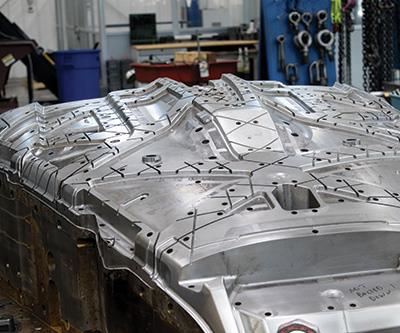
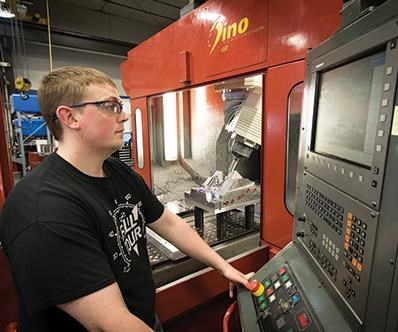
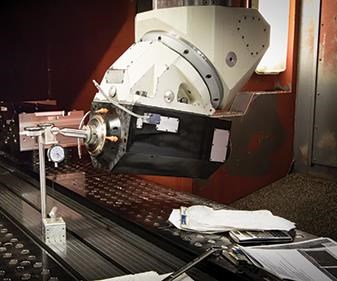
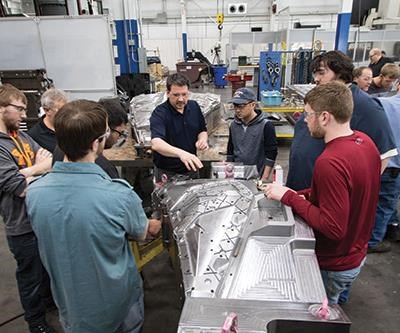
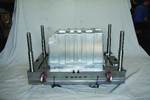





_300x250 4.png;maxWidth=300;quality=90)

.jpg;maxWidth=300;quality=90)














